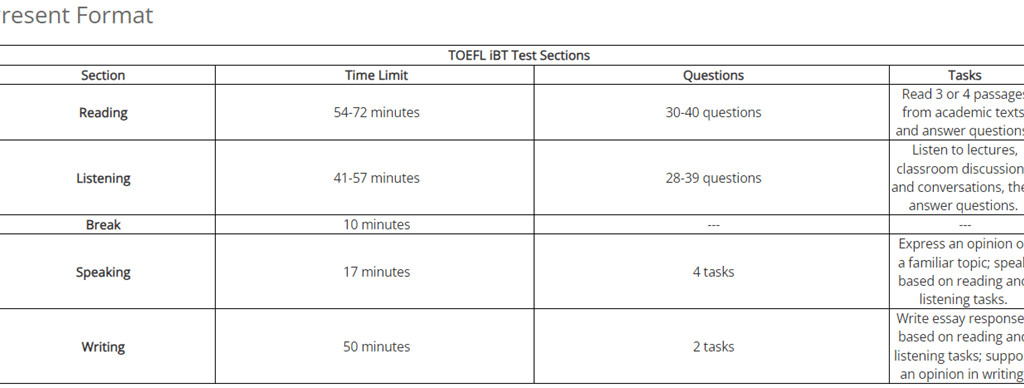Cracking the Code: Understanding the Latest TOEFL iBT Changes

Introduction to the TOEFL iBT
The TOEFL iBT, or Test of English as a Foreign Language Internet-Based Test, is a standardized test that measures the English language proficiency of non-native English speakers.
It is widely accepted by universities and colleges around the world as a requirement for admission.
The test assesses the four language skills: reading, listening, speaking, and writing.
For non-native English speakers, the TOEFL iBT is an important test as it serves as a benchmark for their English language abilities.
It provides an objective measure of their proficiency and helps them demonstrate their readiness for academic studies in an English-speaking environment.
Many universities and colleges require a minimum TOEFL iBT score for admission, and a high score can also enhance scholarship opportunities.
The Latest Changes in the TOEFL iBT
In 2019, the TOEFL iBT underwent some changes to better reflect the skills needed for success in academic settings.
The changes include shorter reading passages, fewer questions in the listening section, and an updated scoring system.
These changes were made to make the test more efficient and to provide a more accurate assessment of test-takers abilities.
The impact of these changes on test-takers is significant.
The shorter reading passages require test-takers to read and comprehend information more quickly, which can be challenging for some.
The reduced number of questions in the listening section means that each question carries more weight, so test-takers need to pay close attention to the audio and answer accurately.
The new scoring system also requires test-takers to achieve higher scores in order to meet the minimum requirements set by universities and colleges.
What is the TOEFL iBT Code?

The TOEFL iBT code refers to the specific instructions and patterns that are used in the test.
Understanding the code is crucial for test-takers as it helps them decode the questions and answer them correctly.
The code includes keywords, signal words, and patterns that can be found in the reading, listening, speaking, and writing sections of the test.
Understanding the code is important because it allows test-takers to quickly identify the main ideas, supporting details, and relationships between ideas in the reading and listening sections.
It also helps them structure their responses in the speaking and writing sections.
By understanding the code, test-takers can save time and improve their overall performance on the test.
How to Crack the TOEFL iBT Code

To crack the TOEFL iBT code, test-takers need to familiarize themselves with the common patterns and keywords that appear in the test.
They should study sample questions and practice identifying these patterns and keywords.
For example, in the reading section, keywords such as “however,” “in contrast,” and “similarly” can indicate a change in direction or comparison between ideas.
In the listening section, signal words such as “first,” “next,” and “finally” can help test-takers understand the sequence of events or ideas.
In the speaking and writing sections, understanding the code can help test-takers structure their responses by using appropriate transitions and linking words.
By practicing with sample questions and analysing the code, test-takers can improve their ability to decode the questions and answer them accurately.
They should also pay attention to their timing during practice sessions to ensure they can complete each section within the allotted time.
Understanding the New TOEFL iBT Scoring System
The new TOEFL iBT scoring system, introduced in 2019, is designed to provide a more accurate assessment of test-takers abilities. The scoring system consists of four sections: reading, listening, speaking, and writing. Each section is scored on a scale of 0 to 30, with a total possible score of 120.
The new scoring system differs from the old system in that it places more emphasis on the individual sections rather than the overall score. This means that test-takers need to perform well in each section to achieve a high score. In the old system, test-takers could compensate for a lower score in one section with a higher score in another.
The new scoring system also provides more detailed feedback on test-takers performance. Test-takers receive a score report that includes their overall score as well as scores for each section. This allows test-takers to identify their strengths and weaknesses and focus on improving specific areas.
Tips for Preparing for the TOEFL iBT
Preparing for the TOEFL iBT requires time and dedication.
Test-takers should start their preparation well in advance to allow for sufficient practice and improvement.
Here are some tips for effective preparation:
1. Familiarize yourself with the test format: Understand the structure of the test and the types of questions that will be asked in each section. This will help you know what to expect and how to approach each section.
2. Practice with sample questions: Use official TOEFL iBT practice materials to familiarize yourself with the types of questions that will be asked. Practice regularly to improve your skills and build confidence.
3. Improve your English language skills: Work on improving your reading, listening, speaking, and writing skills. Read English books, listen to English podcasts or news, practice speaking with native English speakers, and write essays on various topics.
4. Take timed practice tests: Time yourself when practicing to simulate the real test conditions. This will help you improve your time management skills and get used to the pressure of completing each section within the allotted time.
5. Use online resources and study guides: There are many online resources and study guides available that can help you prepare for the TOEFL iBT. Take advantage of these resources to supplement your preparation and gain additional insights.
Common Mistakes to Avoid on the TOEFL iBT
There are several common mistakes that test-takers make on the TOEFL iBT.
These mistakes can significantly impact their scores. Here are some strategies for avoiding these mistakes:
1. Lack of time management: Time management is crucial on the TOEFL iBT. Make sure you allocate enough time for each section and practice completing questions within the given time limits.
2. Not understanding the question: Read each question carefully and make sure you understand what is being asked. Pay attention to keywords and signal words that can help you identify the main idea or the correct answer.
3. Neglecting pronunciation and fluency: In the speaking section, pronunciation and fluency are important factors that contribute to your score. Practice speaking clearly and fluently, and work on improving your pronunciation.
4. Not practicing writing essays: The writing section requires you to write essays on specific topics. Practice writing essays within the given time limit and get feedback from a teacher or tutor to improve your writing skills.
5. Relying too much on memorization: While it is important to familiarize yourself with the code and common patterns, avoid relying too much on memorization. Instead, focus on understanding the underlying concepts and applying them to different questions.
How to Improve Your TOEFL iBT Speaking Skills
The speaking section of the TOEFL iBT can be challenging for many test-takers.
Here are some tips and strategies for improving your speaking skills:
1. Practice speaking regularly: Find opportunities to practice speaking English on a regular basis. Speak with native English speakers, join conversation groups, or use language exchange platforms to practice speaking.
2. Record and listen to yourself: Record yourself speaking and listen to the recordings. Pay attention to your pronunciation, fluency, and grammar. Identify areas for improvement and work on them.
3. Focus on pronunciation: Pronunciation plays a crucial role in the speaking section. Practice pronouncing words correctly and work on your intonation and stress patterns. Listen to native English speakers and imitate their pronunciation.
4. Use appropriate transitions and linking words: In the speaking section, use appropriate transitions and linking words to connect your ideas and make your speech more coherent. Practice using these transitions and linking words in your responses.
5. Be confident and relaxed: Confidence and relaxation are key to performing well in the speaking section. Practice deep breathing exercises and positive self-talk to calm your nerves before the test. Remember to speak clearly and confidently.
Strategies for Success in the TOEFL iBT Reading Section
The reading section of the TOEFL iBT requires test-takers to read and comprehend academic texts quickly and accurately.
Here are some strategies for success:
1. Skim the passage: Before reading the questions, skim the passage to get a general idea of the content and structure. Pay attention to headings, subheadings, and topic sentences.
2. Read the questions first: Read the questions before reading the passage. This will help you focus on the relevant information and save time.
3. Highlight keywords: As you read the passage, highlight or underline keywords that are related to the questions. This will help you locate the relevant information quickly when answering the questions.
4. Use context clues: Use context clues to understand the meaning of unfamiliar words or phrases. Look for clues in the surrounding sentences or paragraphs.
5. Practice time management: Time management is crucial in the reading section. Allocate a specific amount of time for each passage and stick to it. If you are running out of time, make an educated guess rather than leave a question unanswered.
Mastering the TOEFL iBT with Confidence
Mastering the TOEFL iBT requires time, dedication, and practice.
By understanding the test format, familiarizing yourself with the code, and practicing with sample questions, you can improve your performance and achieve a high score.
Remember to focus on improving your English language skills, managing your time effectively, and avoiding common mistakes.
With the right preparation and mindset, you can approach the TOEFL iBT with confidence and achieve your desired score.

